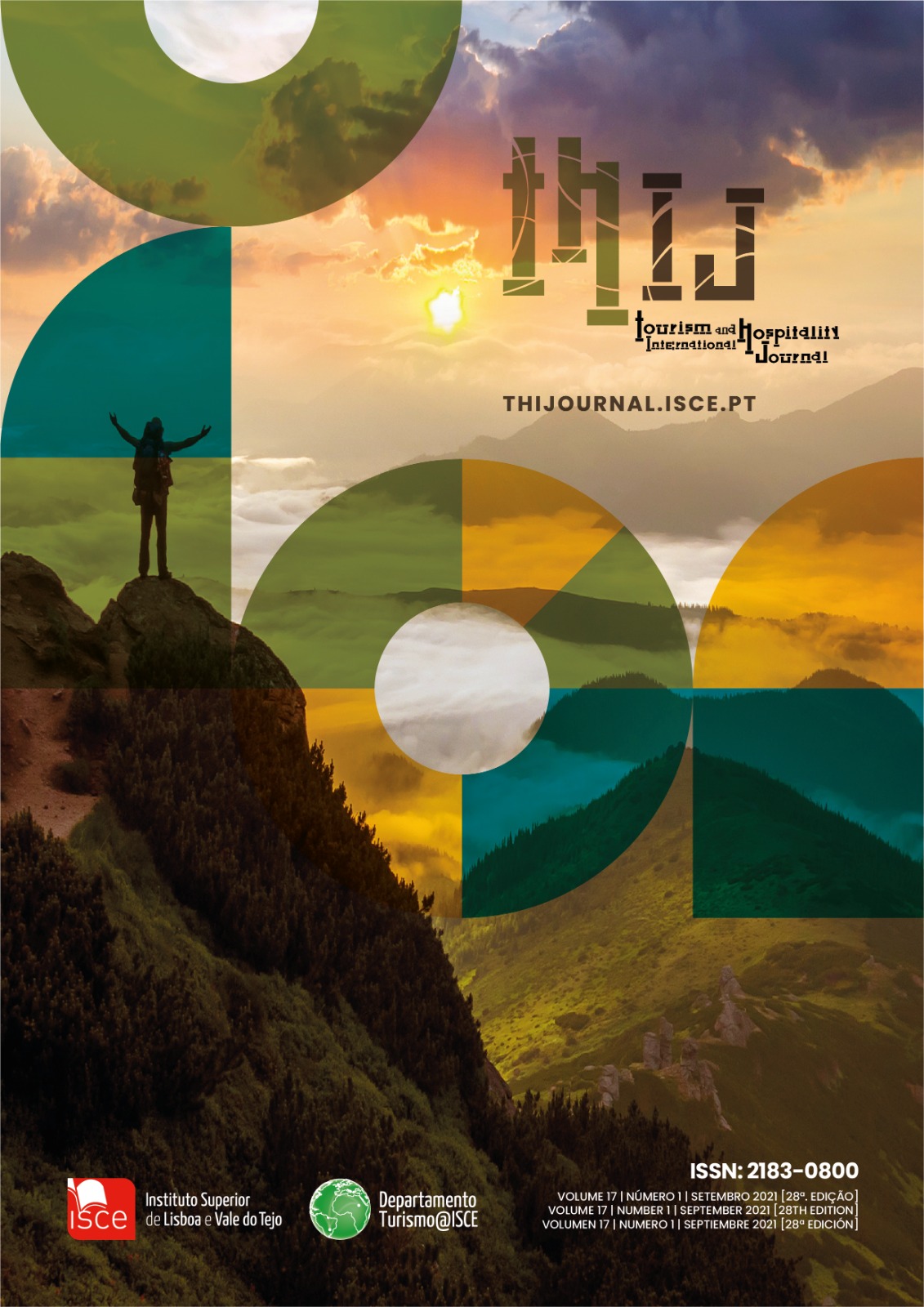Food waste: A problem of the past, present and future
DOI:
https://doi.org/10.57883/thij17(1)2021.30923Keywords:
Tourism, Food waste, RestaurantsAbstract
Food waste is an extremely important adversity in a global context, being directily interconnected with other themes of society, both in a social, health, economy and environmental level. The scope of this paper is the problem of food waste in general, in the world and in Portugal, and also in a specific way, in tourism, particularly in restaurants. In specific terms, we intend to understand, through interviews with employees of different restaurants, their position on this topic, taking into account its influence in a business context and if there are some measures taken to prevent the problem. The results of the interviews made show that this is still an important and current problem despite the people showing more and more awareness about the impacts in the world and in the restaurant business accounts, who try to adopt measures such as the reuse of food or a better food preservation.
References
Acerenza, M. A. (2002). Administração do turismo, 1 – São Paulo: EDUSC.
Almeida, L. S., Freire, T. (2000). Metodologia da Investigação em Psicologia e Educação, Braga, Psiquilíbrios, 2000.
Bruckner, P. (1996). La tentatión de la inocencia. Tradução de Thomas Kauf. Barcelona: Editorial Anagrama.
Continente. (2020). Missão Continente. Consultado em 7 dez 2020. Retirado de https://missao.continente.pt/o-fazemos/planeta/desperdicio-alimentar
Dinheiro Vivo. (2019). Setor Alimentar e Consumidores Podem Mudar Panorama do Desperdício de Comida. Consultado em 7 dez 2020. Retirado de https://www.dinheirovivo.pt/economia/setor-alimentar-e-consumidores-podem-mudar-panorama-do-desperdicio-de-comida-12776120.html
Decreto-Lei nº 191/2009 de 17 agosto do Ministério da Economia e da Inovação. Diário da República, I série, No. 158/2009 (Consult. 7 dez 2020). Retirado de https://dre.pt/pesquisa/-/search/493688/details/maximized
desperdício in Dicionário infopédia da Língua Portuguesa [em linha]. Porto: Porto Editora, 2003-2020. (consult. 2020-12-11). Retirado de https://www.infopedia.pt/dicionarios/lingua-portuguesa/desperdício
European Comission. (2020). EU Action Against Food Waste. Consultado em 7 dez 2020. Retirado de https://ec.europa.eu/food/safety/food_waste/eu_actions/eu-platform_en
FAO. (2013). Food Wastage Footprint – Impacts on Natural Resources: Summary Report.
FAO. (2020). Food Outlook – Biannual Report on Global Food Markets: November 2020. Rome.
FAO. (2020). World Food and Agriculture – Statistical Yearbook 2020. Rome.
Fundação Portuguesa de Cardiologia. (2020). Desperdício Alimentar. Consultado em 7 dez 2020. Retirado de http://www.fpcardiologia.pt/desperdicio-alimentar/
FUSIONS. (2016). Reducing Food Waste Through Social Innovation.
Giddens, A. (2007). Sociologia- Cap.1- O que é a Sociologia? pp 2-19. Lisboa.: Fundação C. Gulbenkian.
Gómez, G., Flores,J. e Jiménez. E. (1999). Metodologia de la Investigación Cualitativa. 2ª edição. Málaga: Ediciones Aljibe.
Guerra, I. C. (2006). Pesquisa Quantitativa e Análise de Conteúdo – Sentidos e formas de uso. Cascais: Princípia Editora.
Gustavsson J., Cederberg C., Sonesson U., van Otterdijk R. & Meybeck A. (2011). Global Food Losses and Food Waste: Extent, Causes and Prevention, Rome: Food and Agriculture Organisation of the United Nations.
Lusiadas. (2020). 12 Gestos para Evitar o Desperdício Alimentar. Consultado em 7 dez 2020. Retirado de https://rotasaude.lusiadas.pt/prevencao-e-estilo-de-vida/nutricao-e-dieta/evitar-o-desperdicio-alimentar/
Ortiga, R. C. (2017). Os Desperdícios Alimentares em Hotelaria (Dissertação de Mestrado, Gestão do Turismo e Hotelaria). Universidade Europeia, Lisboa. https://comum.rcaap.pt/bitstream/10400.26/18591/1/Disserta%C3%A7%C3%A3o%20de%20M-GTH%20-%20Raquel%20Ortiga%2050033546.pdf
Phenix. (2020). Consultado em 7 dez 2020. Retirado de https://wearephenix.com/pt-pt/
Poon, A. (1993). Tourism, Technology and Competitive Strategies. Reino Unido: CAB International.
Rádio Renascença. (2019). Desperdício Alimentar Anual Daria para Alimentar Dois Mil Milhões de Pessoas. Consultado em 7 dez 2020. Retirado de https://rr.sapo.pt/2020/09/29/o-mundo-em-tres-dimensoes/desperdicio-alimentar-anual-daria-para-alimentar-dois-mil-milhoes-de-pessoas/artigo/174960/
Recomendações de Ação para a Prevenção do Desperdício Alimentar. (2020). Desenvolvido pela Plataforma da UE para as Perdas e o Desperdício Alimentares, 12 de dezembro de 2019.
Ribeiro, Elisa Antônia. (2008). A perspetiva da entrevista na investigação qualitativa. Evidência: olhares e pesquisa em saberes educacionais, Araxá/MG, n. 04, p.129-148, maio de 2008.
Too Good To Go. (2020). Consultado em 7 dez 2020. Retirado de https://toogoodtogo.pt/pt
TravelBI by Turismo de Portugal. (2020). Consultado em 7 dez 2020. Retirado de https://travelbi.turismodeportugal.pt/pt-PT/Paginas/HomePage.aspx
TuaSaúde. (2020). Comer Alimentos Fora de Prazo de Validade Faz Mal? Consultado em 11 dez 2020. Retirado de https://www.tuasaude.com/alimentos-fora-da-validade/
Turismo de Portugal. (2020). Consultado em 7 dez 2020. Retirado de http://www.turismodeportugal.pt/pt/Paginas/homepage.aspx
UNRIC. (2020). Objetivos de Desenvolvimento Sustentável. Consultado em 7 dez 2020. Retirado de https://unric.org/pt/objetivos-de-desenvolvimento-sustentavel/
UNWTO. (2020). World Tourism Barometer and Statistical Annex, October 2020
Yeoman, I., Brass, D., & McMahon-Beattie, U. (2007). Current Issue in Tourism: The Authentic Tourist. Tourism Management, 28 (4), 1128-1138.
Downloads
Published
How to Cite
Issue
Section
License
Copyright (c) 2021 This work is licensed under a Creative Commons - Attribution 4.0 International (CC BY 4.0)

This work is licensed under a Creative Commons Attribution 4.0 International License.
This work is published under the Creative Commons Attribution 4.0 International License.






